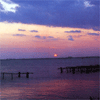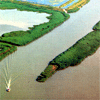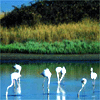|
|
|
Rovigo & Delta del Po Guide Italy
|
 |
 |
 |
 |
|
|
|
|
Directories of Web Sites:
Rovigo & Delta del Po Italy
Rovigo & Delta del Po Hotels
Rovigo & Delta del Po Guide
The Po Delta has its own distinctive, extraodinary and unique character. Created by the slow sedimentation by the river, and by the meanderings of its branches, but mainly by the extraordinarly and skilled works of man over centuries of water management and reclamation of the swampy land; it has assumed the present pattern after banks bursting, memorable floods and huge embankment works. If antiquity provides the myth of Phanteon and tells of the trade that was plied in the area of the river mouth, the development of the territory of the territory dates back to 1152 when the Po burst its banks and, seeiking tyhe shortest way to the sea, ran down three diverging branches to the placid langooodns along the coast, A little less than six centuries later, the Venetians, fearing that the lagoodn would be silted up on account of all the waste material that was washed down to the sea, made what is known as the cutting of Porto Viro, a daring piece of engineering which succeeded in diverting tyhe waters of the river further to the east.
The Delta plant life changes with the different areas and seasons: grasses and bindweed among the sand, followed further inland by silene, prickly asparagus, juniper, etc. An outstanding feature of the Delta is the "valle" or lagoon fish hatchery: this is generally a broad, fairly shallow expanse of brackish water. The typical rural building in these marshlands is the "casone" featuring a tall chimney and derived from old buildings of wood and reeds. Besides the Casoni, which are of various sizes but always built to hte same basic features, there are other settlements from humble farm-houses to Veneto Villas and row of cottages with their square-topped chimneys. There is no shortage of roads, leading through extraordinary enchanting places whose names bear the echoes of a Venetian past, recalling the families who held the estates.
Between Po di Levante River and the Brenta River there are two famous beach resorts: Rosolina Mare and Isola di Albarella.
The true wealth of Rosolina is that it is an area where nature is at one with man. New structures and services for tourism have grown side by side with the enviroment's development: an environment for your holidays. Albarella is an island where you will fully live unique holidays, you will be there offered a shelter from urban traffic and overcrowding, where you will be totally immersed in nature at the sparkling rhythm of sports, performances and cultural activities.
The town of Rovigo is rich in history and culture. Its most famous culture institution is the Concordi Academy, which is also one of the most important art-galleries in Veneto. This Accademy, risen in 1580, began to devote itself to painting at about the half of the 18th Century ordering to the most important Venetian painters an extraordianly series of portraits representing famous people living in Rovigo and Venetian patrons. The Count Giovanni Frascesco Casilini becomes a real Venetian art-collector of the 15th and 16th century; he puts together in his palace almost two hundred works and later he decides to leave a legacy of those to the Concordi Academy showing an unlimited sensitiveness. The picture-gallery of the Concordy Academy rises in 1833 with arrival of the casilini collection. Later on, other generous citizens give their paintings. In 1878 and in 1901 came other two important legacies. The art-gallery boasts more than 450 works prevaletly of Venetian art and from the 15th to the 18th Century, some of these are real masterpieces known all over the world. In 1982 the gallery of the Episcopal Seminary, with two hundred works, has been entrusted to the Concordy Academy. The scholars consider it one of the most important art-gallery in Veneto.
Like all Veneto, the Rovigo's Province is rich in Villas. The artistic phenomenon of the Polesine Villas was closely linked to the expansion on the mainland of the Venetian dominion. Confirmation of this can be found in the original names of the main Villas which were commissioned precisely by Venetian patricians. However, this characteristic diminishes and almost disppears as you near the banks of the Po where the Venetian influence gave way to an Emilian influence, particularly that of nearby Ferrara.
For reason of a historical and enviromental nature, there are no Gothic or early Renaissance Villas; the oldest among them consequently date back to the 16th Century (Nani Mocenigo at Canda, Schiat at Ficarolo, Badoer and Grimani at Fratta Polesine, Dofin at Lendinara, etc.). More numerous and of remarkable quality are the group of the 17th century Villas (Grassi at Baricetta, Pellegrini at Salvaterra, Roveri at Calto, Oroboni at Fratta Polesine, etc.) and those of the 18th Century (Bellettato, Davã, Dolfin at Fratta Polesine, Menotti at Lama di Gavello, Tiepolo at Albarella, etc.). Furthermore, can be find 19th century examples from the neoclassic era such as Zambelli at Cesenelli, Contarini at Contarina.
(Part of the Contents and the Photos are taken from "Il Delta del Po" by
Regione Veneto - Assessorato al Turismo; "Rovigo e le sue Pinacoteche" by
APT Rovigo) |
|
|
|
Acquista la tua visibilità su Travel Plan
|
|
|
|